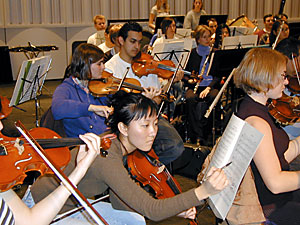 |
|
Photo Courtesy of ARIZONA THEATRE COMPANY
|
Arizona Symphony Orchestra - Some of composer Charles Ives' works will be performed at Crowder Hall Saturday by the Arizona Symphony Orchestra. Legend has it that Ives was inspired by hearing two marching bands cross paths.
|
|
|
By Andi Berlin
Arizona Daily Wildcat
Thursday, March 3, 2005
Print this
Producing wonderful music is complicated. A good sense of rhythm and tonality has to come naturally to the player, but technical skills are considered anybody's game. Accuracy is sought through hours of repeated practice, but the creativity to develop new ways of expressing the notes is inherited.
Being ahead of your time is always important. But 50 years after his death, music still hasn't caught up to Charles Ives.
This being said, the featured composer for this year's "Concerts in Context" show at Crowder Hall will make for an interesting night.
Charles Ives, born in 1874, is considered one of America's most important avant-garde composers. His fusion of complicated rhythmical structures and sounds with popular American songs of his day made him accessible to the populace, but creative and original at the same time.
"(Ives is) very impressionistic in some ways. Expressionistic in other ways. But at the same time, he quotes from hymn tunes, popular songs of the time," said Dr. Thomas Cockrell, director of the Arizona Symphony Orchestra. "So there's a familiarity at the same time but seen through this sort of prism of very unique expression on his part."
This would not have been possible if not for Ives's unique childhood. His father, a band leader in the Civil War, encouraged and taught Ives how to play the piano at a young age. At 13, Ives began to compose simple marches, fiddle songs and church tunes; the music his father and childhood had exposed him to.
His experimental nature came out later, when he began to add complex structures into his music.
"He's famous for overlapping different rhythms at the same time. For example, at one point in time, he's got a waltz going on," Cockrell said. "At the same time, a march is going on. So you get this three-fourths time and this four-fourths time and various other things."
Ives was the first composer of his time to not seek acceptance in European classical music circles. In the 1920s and '30s, while many traveled to Europe to prove themselves, Ives proved that home-grown artists could achieve success while staying at home.
The "Concert in Context" will provide an insight into his personality, as it will include more than just music. In addition to a performance by the Arizona Symphony, Theatre Arts professor Harold Dixon will portray Ives in a monodrama.
This onstage discussion between Dixon (playing Ives) and Cockrell (moderating) will shed light to the way Ives thought, and help give a deeper appreciation of his life and genius. Says Cockrell, "It's visual, musical, historical, and it should be entertaining, this monodrama."
The "Concerts in Context" is all part of the larger "Arizona Cultural Forum," a two-day event featuring multiple discussions and performances. The Forum is bridging the gaps between literature and music by looking at the similarities between Ives and transcendentalist philosopher Henry David Thoreau.
"I try and show connections between music and the other arts. Whether it be visual art, poetry, painting, architecture, humanities, history. I sort of try and put everything in," Cockrell said.
"Unanswered Question: An Orchestral portrait of Charles Ives" will start at 7:30 p.m. Saturday in Crowder Hall. Tickets are available through the UA box office and are $5 for students.
